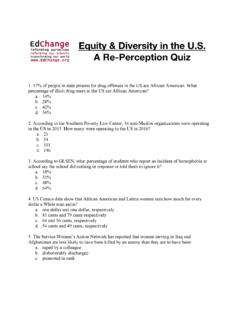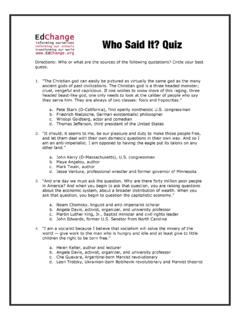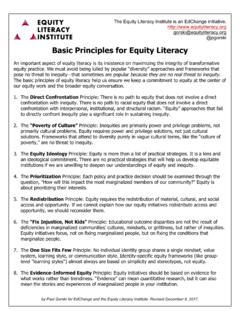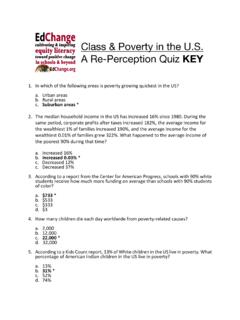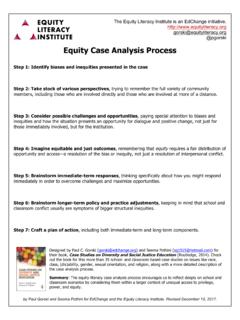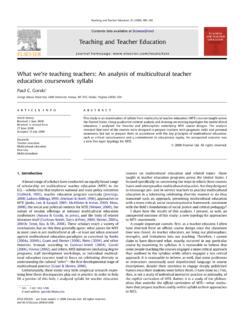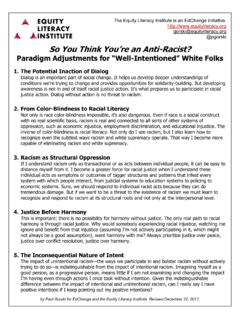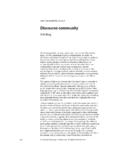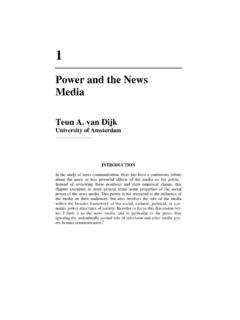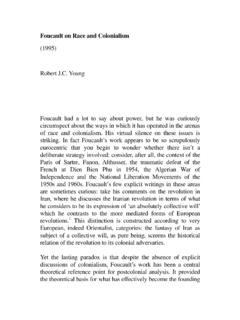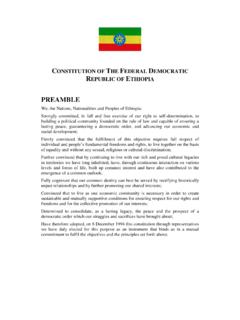Transcription of Unlearning Deficit Ideology and the Scornful Gaze ...
1 Unlearning Deficit Ideology and the Scornful Gaze: Thoughts on Authenticating the Class discourse in Education Paul C. Gorski Founder, EdChange Assistant Professor, Integrative Studies George Mason University December 2010. Unlearning Deficit Ideology and the Scornful Gaze 2. It is popular in the education milieu today to talk about the dangers of assuming a Deficit perspective, approaching students based upon our perceptions of their weaknesses rather than their strengths. Such a perspective deteriorates expectations for students and weakens educators' abilities to recognize giftedness in its various forms (Ford & Grantham, 2003).
2 The most devastating brand of this sort of Deficit thinking emerges when we mistake difference particularly difference from ourselves . for Deficit . If one concentrates best while sitting still it may be difficult to imagine that somebody else a student or colleague, perhaps concentrates more effectively while pacing or tapping a pencil. Similarly, if one always has lived among people who speak a certain language variation, such as what people commonly refer to as standard English, she or he might mistake somebody's use of a different variation, such as the Appalachian variety spoken by my grandmother, as an indication of intellectual inferiority or, worse, deviance (Collins, 1988).
3 Over the past ten or so years a critical discourse challenging the Deficit perspective has emerged among educators. Some insist that every student is gifted and talented. Others urge us to find the gift in every child ; to focus on student strengths. Unfortunately, like many discourses in the education milieu, the one surrounding the Deficit perspective occurs largely outside of what Nieto and Bode (2008). call the sociopolitical context of schooling, the unexamined ideologies and myths that shape commonly accepted ideas and values in a society (p. 7). So while this discourse involving Deficit perspective focuses on individual attitudes and biases, it rarely addresses the ideologies or conditions which underlie and perpetuate the Deficit perspective.
4 Like most repressive dispositions, the Deficit perspective is a symptom of larger sociopolitical conditions and ideologies borne out of complex socialization processes. We no more can quash the Deficit perspective without acknowledging, examining, and quashing these processes than we can eliminate racism without comprehending and battling white supremacist Ideology . Otherwise we are dealing merely with symptoms, as we do when we attempt to redress racism with programs that Paul C. Gorski, 2010. Unlearning Deficit Ideology and the Scornful Gaze 3. celebrate diversity but ignore systemic racism or when we respond to class inequities by studying a fictitious cultural of poverty rather than attacking, or at least understanding the educational implications of, the sociopolitical context of economic injustice.
5 The Ideology underlying the Deficit perspective has been described as Deficit theory (Collins, 1988; Dudley-Marling, 2007; Gorski, 2008a), Deficit Ideology (Sleeter, 2004), and Deficit thinking . (Ford & Grantham, 2003; Pearl, 1997; Valencia, 1997; Yosso, 2005). I have chosen to use the term Deficit Ideology in this chapter in order to emphasize that it is, in fact, an Ideology , based upon a set of assumed truths about the world and the sociopolitical relationships that occur in it. Despite variations in terminology, scholars who have studied Deficit Ideology similarly refer to something deeper than individual assumptions and dispositions.
6 They describe an institutionalized worldview, an Ideology woven into the fabric of society and its socializing institutions, including schools. They describe an Ideology which shapes individual assumptions and dispositions in order to encourage compliance with an oppressive educational and social order. As Sleeter (2004) explains, the long-standing Deficit Ideology still runs rampant in many schools despite the abstraction that all children can learn' (p. 133). Briefly, Deficit Ideology is a worldview that explains and justifies outcome inequalities . standardized test scores or levels of educational attainment, for example by pointing to supposed deficiencies within disenfranchised individuals and communities (Brandon, 2003; Valencia, 1997a.)
7 Weiner, 2003; Yosso, 2005). Simultaneously, and of equal importance, Deficit Ideology discounts sociopolitical context, such as the systemic conditions (racism, economic injustice, and so on) that grant some people greater social, political, and economic access, such as that to high-quality schooling, than others (Brandon, 2003; Dudley-Marling, 2007; Gorski, 2008a; Hamovitch, 1996). The function of Deficit Ideology , as I will describe in greater detail later, is to justify existing social conditions by identifying the problem of inequality as located within, rather than as pressing upon, disenfranchised communities so Paul C.
8 Gorski, 2010. Unlearning Deficit Ideology and the Scornful Gaze 4. that efforts to redress inequalities focus on fixing disenfranchised people rather than the conditions which disenfranchise them (Weiner, 2003; Yosso, 2005). Dudley-Marling (2007) has warned of a recent resurgence of Deficit Ideology in the , particularly visible in discourses related to low-income people's access to public services such as high- quality education, welfare, and healthcare. In the case of education, the class discourse tends to focus on outcomes in educational achievement, and more specifically on how to close achievement gaps between low-income students and their wealthier peers; a framing which is, itself, a symptom of Deficit Ideology (as I will explain later).
9 It is my intention here to describe the nature of this current wave of class-based Deficit Ideology , the ways in which it has come to dominate today's discourses on the education of low-income people, and the consequences thereof. In the process of doing so I hypothesize a process by which people in the , including teachers, are socialized to comply with Deficit Ideology . I. then discuss ways to spot and interrupt class-based Deficit Ideology in educational contexts. Conceptualizing Deficit Ideology Deficit Ideology is a remnant of imperial history (Shields, Bishop, & Mazawi, 2005), a mechanism for socializing citizens to comply with a host of oppressions, from colonization to enslavement, educational inequities to unjust housing practices.
10 In the most basic terms, Deficit Ideology can be understood as a sort of blame the victim mentality applied, not to an individual person, but systemically, to an entire group of people, often based upon a single dimension of identity. At the core of Deficit Ideology is the belief that inequalities result, not from unjust social conditions such as systemic racism or economic injustice, but from intellectual, moral, cultural, and behavioral deficiencies assumed to be inherent in disenfranchised individuals and communities (Brandon, 2003; Gorski, 2008a, 2008b;. Valencia, 1997a; Yosso, 2005). The Deficit ideologue justifies this belief by drawing on stereotypes already well-established in the mainstream psyche stereotypes which paint disenfranchised Paul C.

